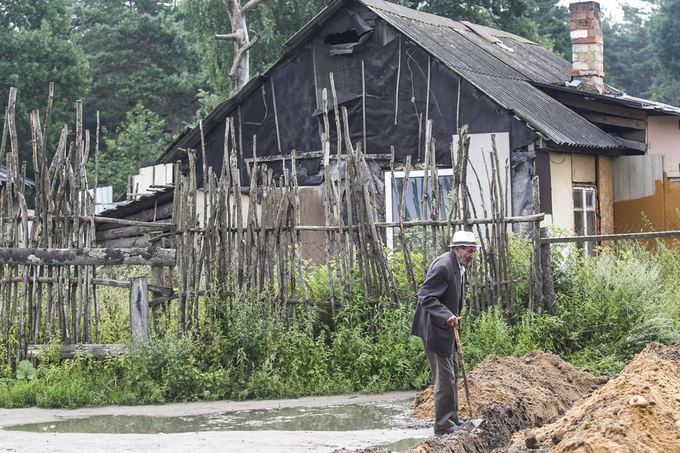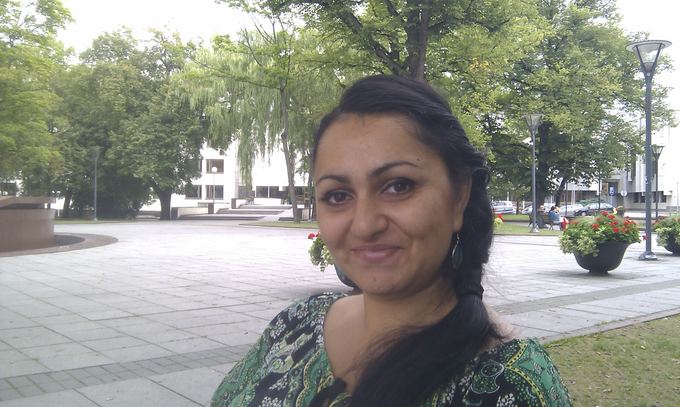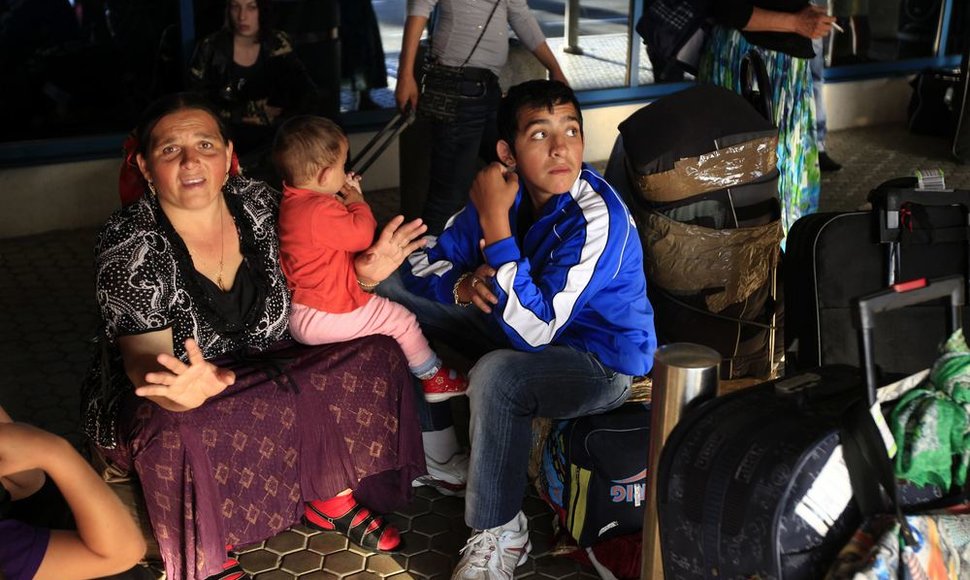Special-needs schools, intended to provide simplified curriculum for mentally challenged kids, have come to be the only accessible education institutions to impoverished Roma families in a Lithuanian provincial town, yet they effectively close all doors to further study and thus social advancement.
Vilma, a Roma woman from the town of Žagarė in northern Lithuania, has only finished two grades at school. Three of her sons went to a special-needs school because it was the only institution where they could get free boarding and teaching materials.
“When I sent my three sons to school, at first they went to a regular school with other kids. Then came tougher times, the economic crisis hit my pocket hard. You have to buy everything, including slippers, and my income was much too low. So I decided to send them to a special-needs school,” Vilma explains.
Upon her own request, the three boys were transferred to Žagarė Special-Needs Boarding School.
“There is only one Roma pupil in Žagarė Gymnasium, while over ten receive education in Žagarė special-needs school, even though they have no disabilities whatsoever,” Jolanta Stasilo, 21-year-old participant in the National Social Integration Institute's journalism programme, tells 15min.
She notes that Roma kids end up in special-needs boarding schools by their parents' request. “They send their children to these institutions, because there they can get board and lodging, teaching materials, they get clothing, shoes, etc. Some parents even receive benefits for raising supposedly disabled kids,” Jolanta relates.
 |
| Lithuanian Roma community is among most socially margialized groups in the country |
Vicious circle of impoverishment
Vilma, the mother of three school-aged Roma boys, has related to Jolanta and her colleagues how Roma families are visited by representatives of Žagarė Special-Needs School before the start of academic year and instructed about the advantages of sending their offspring to the institution: “Sure, there is no coercion here, but Roma families, especially those in the social risk group, are tempted by what they can get and go for this option.”
Jolanta believes that by doing so, Roma parents shut all available avenues for their children to seek social advancement, integration into the society, and further education.
“Kids are put in a labyrinth they cannot escape, because decisions are made by their parents, not themselves. Children cannot resist, which can also create a bad precedent. For example, one day parents can decide their 5-year-old kid will quit school and go to work instead. We cannot allow that – the state must interfere. If a family cannot provide proper welfare and education for their kid, the society must step in,” Jolanta believes.
Learning at least to read and write
Special-needs schools readily accept Roma children without any disabilities because government funding depends on the number of pupils they have.
“The problem here is that Roma families are not inclined to take care of their children's education from an early age – they are left to grow in semi-wilderness. A kid, who has not been to a kindergarten, hasn't experienced any discipline, no social skills or basic grammar, finds it hard to adapt in school. But that does not mean such kids are mentally challenged or disabled,” Jolanta says.
She thinks that special-needs schools should be reserved to children with behavioural or mental disorders. Meanwhile Roma parents opt for such schools because it is a cheaper way to provide their offspring with education, however inadequate. Nor are they concerned that their perfectly healthy children are marked out as handicapped in official documents.
Sate institutions, it seems, lose little sleep over it either. Jolanta believes that officials of pedagogical psychology services are rather sceptical about Roma kids ever graduating, while in special-needs boarding schools they will at least learn to read and write.
This argument helps Roma parents to convince state bureaucrats to issue recommendation letters necessary to transfer their children to special schools.
 |
| Božena Karvelienė |
Forbidden to go to school by father
The situation indicates that, despite numerous social integration programmes, Lithuania still fails to provide a number of Roma kids with proper education and equal opportunities to social advancement.
According to Neringa Jurčiukonytė, director of the National Social Integration Institute, the problem is a lack of consistent education strategy and proper monitoring in the country.
“Roma kids drop out of the education system, they often do not make it past primary school. The reasons behind this are complex: kids do not go to school, because, for instance, they do not have winter shoes or warm clothes. Besides, there is a general lack of motivation to study, because their own parents, often illiterate, fail to see any point in seeking education. On the other hand, many schools, funded as they are in proportion to the number of students they have, try to keep Roma kids “on paper” and transfer them to other classes, while in fact these kids do not show up at school for months,” Jurčiukonytė comments.
Božena Karvelienė, who runs the Roma Integration House, works as a teaching assistant at Vilnius Saulėtekis Secondary School and notes that many Roma children who start school speak neither Lithuanian nor Russian.
“Therefore their progress is much slower compared to their classmates. The problem is that teachers cannot afford to pay more attention to Roma kids in order to bring them up to the curriculum requirements. As a result, they get taught according to adapted programmes and it often happens that a kid in the third grade is given to solve first-grade math problems,” Karvelienė explains.
She also notes that parents have a crucial impact on their children's performance at school. “Parents do not let their kids go to school, because they do not have enough money. In order to take them there, they need to buy a public transport ticket, which costs money. There is also the issue of Roma tradition. For example, I went to school until I was 14. After that, my father decided I was too old to think about studying instead of family, so he forbid me to go on,” Karvelienė relates.
Fifth of Roma without schooling experience
The woman got married at the age of 18 and had a baby girl. “However, life with my husband did not go well, we divorced and I decided I wanted to achieve something in life – to study and work,” says 32-year-old Karvelienė.
She graduated from an adult school and got a job as a croupier in one of Vilnius casinos.
“I met my current husband through a colleague. He is a biochemistry doctor. And I am planning to go to college to study pre-school education,” shares the woman who is a mother of two.
She thinks that personal qualities and motivation play an important role in one's success. “With Roma people, however, it takes extra work to convince them of the need of education in the first place, of why you need to work. And that is something you need to do from an early age, otherwise children from socially marginalized families lose any motivation and do not return to school,” explains Karvelienė.
According to a study recently conducted by the Ethnic Research Centre, the Roma community is among the most discriminated groups in Lithuania.
A 2008 study has revealed that one fifth of Roma people in Lithuania have never gone to school, while only 17.3 percent advanced beyond ninth grade. Over half of Roma respondents in the survey had education which did not exceed that of their parents. The figures indicate that there is little social development in the Roma community and integration programmes are largely ineffective.













